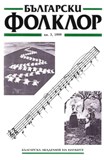Български воински песни
Bulgarian Military Songs
Author(s): Nikolay KaufmanSubject(s): Anthropology
Published by: Институт за етнология и фолклористика с Етнографски музей при БАН
Summary/Abstract: Bulgarian military songs started to appear in the 19th c., in the period of National Liberation. Bulgarian volunteers, preparing themselves in Kishineu to serve on Russian military service during the Russian-Turkish war, still in 1877 sung “Shumi Maritza” and other soldat songs, and continued to sing them during the war itself. Precisely at those times the marching step and the marching songs accompanying it, were used for the first time by the Bulgarians. All that resulted in the early Bulgarian songs being marching ones. At the very beginning Bulgarian military troops used to sing well known folk songs (mainly folk dance ones) in a marching rhythm. Gradually there appeared true marching songs, whose texts were written mostly by military officers. Their melodies were more often than not plagiarized from urban song ones, and only exceptionally created by musicians on military service. Among the latter there should specially be mentioned Alexandar Morfov, whose military songs written in the beginning of 20th c. (Niy shte pobedim, Izgrey zora na svobodata, etc.) are already real marches sung even today by the Bulgarian military troops as both their texts and their sounds are tightly connected with the soldiers’ activities and with the army life. Bulgarian poets and composers joined later their efforts in creating military marches. Especially during the war periods (1912-1913 and 1914-1918) they wrote masterpieces like Velik e nashiat voinik, Bdintzi, Bulairski marsh which are still in use in the army. There were created military songs and marches in the next decades, too. Especially productive was the second half of the 20th c. with its marches written in broader forms, sophisticated musical facture (or at least such in comparison with the older marches), but they did not gain the acknowledgement and the popularity of the older ones created in the first decades of the 20th c.
Journal: Български фолклор
- Issue Year: XXV/1999
- Issue No: 3
- Page Range: 39-50
- Page Count: 12
- Language: Bulgarian
- Content File-PDF

